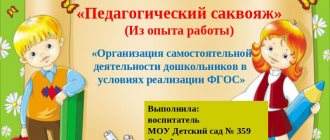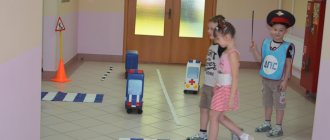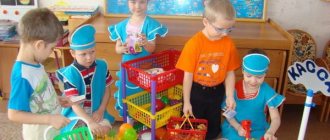Play activities of preschoolers in the light of the Federal State Educational Standard DO Article
Play activities of preschoolers in the light of Federal State Educational Standards for Preschool Education
The stage of preschool childhood plays a significant role in the manifestation of the child’s creative potential, the awakening of independence, the formation and development of a person’s personality as a whole. The decisive condition for the formation of a child’s individuality is his entry into a special dimension of childhood activity. The leading model of behavior and exploration of the world for a child is, of course, play. While playing, the child meets and communicates with other children, learns to make friends and build relationships, imitates adults, masters the unknown, learns what is good and what is bad. Below we will look at what conditions the Federal State Educational Standard prescribes when developing the play activities of preschoolers.
Modern play activities for preschoolers according to the Federal State Educational Standard
Children's games are not games at all, and it is more correct to look at them as the most significant and thoughtful activity of this age.
Michel de Montaigne
In the light of modern requirements, two possible ways of organizing play in kindergarten are identified. The first way lies in the influence of an adult on the content of the child’s story-based game, traditional for domestic pedagogy. In accordance with the second way, play is considered as an activity in which the child has the opportunity to realize his creative potential, that is, not only to reproduce and repeat what others have created, but also to act as a creator himself.
This is when the interaction of an adult with children is built on the basis of partnerships, i.e. the adult acted as the same play partner for the child as the other child. The basic principles of the concept of the gradual formation of ways of playing:
- In order for children to master gaming skills, an adult should play with them.
- starting from an early age and further at each stage of preschool childhood, when developing a child’s gaming skills, it is necessary to orient him to interaction with a peer partner, “provide” him with ways to coordinate actions with partners.
- an adult, playing with children throughout the entire preschool period, must, at each of its stages, develop the game in such a way that the child “discovers” and assimilates specific, gradually becoming more complex ways of constructing one or another type of game.
In paragraph 2.7 of the Preschool Education Standard, play is defined as a tool for organizing a child’s activities, his multifaceted development in the social-communicative, speech, cognitive, artistic-aesthetic and physical educational areas. The Federal State Educational Standard for Preschool Education indicates specific features of the gameplay of a preschooler, depending on the age category:
infant stage (two months - one year) - object play, acquaintance with the object world, acquisition of basic skills in manipulating objects, close emotional contact with family;
- early childhood (one to three years) - playing with combined and dynamic toys, communicating and playing with other children under adult supervision;
- preschool period (three to eight years) - a more complex plot-role format of play activity, a communicative game in compliance with certain rules.
Clause 4.6 of the Federal State Educational Standard for Educational Education stipulates the importance of developing gaming activities in the formation of social and normative foundations of a child’s behavior, as well as in increasing the efficiency of the educational process:
- Awakening interest - the learning process in a playful way entertains, brings pleasure and joy, neutralizes stress, turns knowledge of the world around us and the development of new practical skills into an exciting journey.
- Self-knowledge and self-realization - the baby gets to know his inner world, learns to show initiative, express his opinion in communication, rely on independence in design, make an informed choice of occupation and play partners;
- Forming a culture of cooperation - a joint game helps develop psychological skills of solidarity, teaches collective activity, the ability to hear not only oneself, but also one’s playing partners, is an excellent practical training in the art of conflict resolution and the ability to find a compromise, fosters respect for other people, develops a sense of justice and self-respect;
- Socialization - the child learns to distinguish between real reality and conditional reality (“make-believe”), develops the volitional qualities of self-discipline and understands the need to follow norms and rules;
- Development of communication skills - the baby masters such a tool as speech to solve the problem of mutual understanding and transfer of information.
- Play therapy helps in overcoming difficulties that arise in any area of the child’s activity.
Principles of organizing the game:
- a free form of child activity, excluding coercion, performed for the sake of obtaining positive emotions from the process itself, and not just from the final result of such activity;
- creative character, built on the principle of initiative, original improvisation and originality;
- emotional passion, manifested in the spirit of rivalry and competition;
- following rules that directly or indirectly reflect the logical sequence and meaningful design of the game.
Typology of play activity of preschoolers
Kinds
Games initiated by the children themselves (independent games):
- plot-display;
- role-playing game;
- director's production;
- theatrical improvisation.
Games born on the initiative of adults. Games with a pronounced educational character:
- didactic games with plot drawings;
- experimental game, travel game with search elements;
- moving at different levels of intensity;
- didactic games with musical accompaniment.
Games that are a form of relaxation or change of activity:
- entertaining games;
- intellectual puzzles and competitions;
- calendar and thematic holidays, carnival performances;
- theatrical costumes;
- folk games and folklore traditions that came to the modern world from the historical past.
Standalone game
At the age of three to five years, a child begins to discover the wonderful world of role-playing games, mastering the basics of role-playing, imitating the behavior of a character from the outside world. The basic basis of such a game is the plot; at this age, everyday scenes from family life become favorites. By first mastering the simplest manipulations with objects, later with their symbolic substitutes, then imitating the social roles of adults, the child improves the mechanisms of abstract thinking and undergoes playful practice in studying various models of behavior in society.
Plot-display game
Plot-based play appears from the age of three and precedes more complex plot-role play. The peculiarity of this game is that the child plays alone, the game actions are focused on the toy, but spiritually reflects the world of human relationships, emotions of joy or disappointment, lines of argument or approval, behavior of obedience or rebellion. Thus, the baby does not take on the role in full, but in play actions in relation to the toy he reproduces the model of behavior characteristic of a particular person. At the age of four or five years, the main characters in the game are still toys, but a more vivid emotional embodiment appears in gestures and facial expressions, dynamic poses of the child himself or the object. The so-called game attributes begin to acquire great importance, for example, a car for the driver, a pointer for the teacher, a doctor’s medical gown, a military cap, etc.
Director's play
Director's play is the least studied phenomenon; it has an exclusively individual character, when the child, acting as a director and screenwriter at the same time, comes up with words for the characters and himself plays their roles, being the author and actor in one person. You can often observe how a child, completely absorbed in building a house or playing with his favorite doll, acts out scenes between fictional characters and, pronouncing their words, does not seem to notice those around him.
Theatrical game
Based on a literary plot, children act out some scene using costumes or puppet theater characters (floor dolls or bibabo dolls), musical accompaniment or pantomime, choreography can be included, but then the help of adults is necessary. Such games teach children to read the mood or emotional state of another person by their facial expressions and gestures, develop a sense of empathy, teach them to understand and feel the people around them, and therefore build appropriate behavior. In addition, heroes are usually the fairy-tale embodiment of good and evil, light and dark forces, and as you know, good always defeats evil in the ending of a fairy tale. Such an unconditional victory of good attracts children and becomes the basis for optimism in life, stimulates the desire to imitate positive characters who are the embodiment of honor and nobility.
Role-playing game
For older preschoolers (6–7 years old), it will be important not to turn to a toy, but to communicate with children who play the role of heroes in the game plot. At this age, a child goes beyond everyday stories; he is inspired by larger-scale, “global” projects, for example, flying into space or traveling around the world, building a railway, etc.
Development under the conditions of the Federal State Educational Standard
The complication of a child’s gaming skill goes through three phases: first, adults are the initiators of the game and the authors of the plot plan, then only their prompt is required, and finally, the child improves his gaming skills to the level of complete independence. The child’s rich imagination and creative improvisation will make the game original and varied in its design, and therefore more interesting and exciting. In order for the games to be truly interesting and varied, serious work on the part of adults is required to involve the child in cognitive activity (clause 2.6 of the Federal State Educational Standard for Education). An erudite child with a developed understanding of the world around him for his age is bursting with new ideas, involving new participants in the game and filling it with deep content.
Basic requirements for effective organization and conduct of the game.
Two models of adult behavior:
- the adult is the inspirer, organizer and coordinator of the game based on a pre-prepared plot and available tools;
- the adult joins the spontaneous initiative of the children, occupying an equal position with the other players, and can influence the course of the game in ways common to all. He can suggest a new character, come up with a plot twist, etc.
Tasks of managing children's play activities:
- Stimulate playful reproduction of events in everyday life, thus achieving familiarity with the purpose of objects and mastering the skills of their practical use.
- Help to master the ability to see, understand and formulate the task of the game.
- To teach the search for various options for using toys during the game.
- Encourage the use of symbolic objects that replace real-life objects.
- Create game situations with fictional objects.
- To form the experience of replacing some game actions with images of a verbal form of expression.
- Arouse in children the desire to find different options for solving a game problem, using new combinations with objects.
- Develop independence in making decisions and searching for various tasks and goals of the game.
- Instill a gaming culture, i.e. teach to recognize the right of each participant to their own gaming space and respect the interests of all players.
- Stimulate the expression of keen interest in the games of peers.
- Learn to set a game task yourself and accept the task set by others.
- Encourage the invention of interesting and unusual game ideas.
- Teach the ability to negotiate.
An experiment game is a type of didactic game, an interactive form of conducting an educational lesson, during which visual modeling and imitation of the phenomena being studied are organized. Through experimental and research activities, a child gains new knowledge or acquires skills. “How does sound travel?” With the help of simple devices, such as a bowl of water or a small pool, coins or construction kit parts, the teacher invites children to understand the origin of the physical phenomenon of sound transmission. Children, throwing coins into a container of water, notice wavy circles spreading across the water. The teacher explains that sounds from the interlocutor or from another sound source reach us in the same waves, but through the air.
Rules of conduct for a teacher in the practical implementation of socio-game technology:
- absolutely exclude authoritarianism and dictatorship, except for those situations that may pose a potential danger to the health of children;
- take a democratic position on an equal basis with all participants in joint activities;
- keep a pause of non-interference and silence, such behavior will give children the opportunity to show independence in solving a problem or conflict;
- take into account the real capabilities of children, but try to expand the zones of independence, not chew knowledge and not give ready-made algorithms;
- help the child overcome shyness and uncertainty, having in the pedagogical reserve a set of exercises that will increase self-esteem and give confidence in their own abilities;
- moving away from a clear goal setting, it is more acceptable to create conditions for the discovery of the child’s intellectual and creative potential;
- during the presentation stage, give the first word to low-active children.
Clause 3.3.5 allows the educational organization to independently determine gaming equipment. According to the requirements of the Federal State Educational Standard for Education, the set of toys should be replenished gradually and periodically changed in accordance with the age and life experience of the children.
The skill of a teacher is most eloquently demonstrated in his ability to organize the independent activities of his students. The teacher needs to skillfully direct each child to an entertaining, but at the same time useful game, while it is important to rely on initiative and develop the child’s curiosity. An attentive and caring teacher will correctly distribute children among game tasks so that they do not interfere with each other, and will show sensitivity and fairness in resolving a conflict situation that arises during the game. Thus, the harmonious creative development of children depends on the level of professional training of the teacher.
Organization of role-playing games in the context of the implementation of the Federal State Educational Standard
Play is important in a child’s life; it has the same meaning as activity, work, or service for an adult. What a child is like at play, so in many ways he will be at work when he grows up. Therefore, the education of a future leader occurs, first of all, in play. Makarenko A. S.
Preschool childhood is the most important period of personality development. During these years, the child acquires initial knowledge about the life around him, he develops certain attitudes towards people, towards work, develops skills and habits of correct behavior, and develops a character.
The main activity of preschool children is play. Play at this age is a special activity that accompanies a person throughout his life. The game develops the child’s spiritual and physical strength; his attention, memory, imagination, discipline, dexterity, all aspects of his personality are formed and developed, significant changes occur in his psyche, which prepare the transition to a new, higher stage of development. In the studies of L. S. Vygotsky, A. N. Leontyev, A. V. Zaporozhets, D. B. Elkonin, play is defined as a leading type of activity that does not arise through spontaneous maturation, but is formed under the influence of social conditions of life and upbringing. The game creates favorable conditions for the formation of the ability to perform actions in the mental plane, and carries out psychological replacements of real objects. A special place in the activities of a preschooler is occupied by games that are created by the children themselves, these are creative or role-playing games. In them, children reproduce in roles everything that they see around them in the life and activities of adults.
The main points of the methodology for using role-playing games:
1. Game selection. The choice of game is necessarily determined by the specific educational task.
Pedagogical development of a game plan. The initial stage of the pedagogical design of a long game is the outline of its plot, the definition of game roles and filling them with specific content.
Introducing children to the game plan. The game plan that the teacher develops can be offered to children in the senior and preparatory groups.
Creating an imaginary situation. This is the most important basis for starting a role-playing game. It is very important for a teacher to help a child enter a gaming situation so that the game captures his imagination and brings him the joy of creativity.
Distribution of roles. When distributing roles, the teacher strives to satisfy the play needs of children, that is, he gives everyone the desired role, suggests a sequence of playing roles of varying degrees of activity, and looks for opportunities to establish the child’s position in the team through a play role.
Start of the game. In order to evoke a positive perception of long-term play in children, the teacher needs to take care of the beginning of the play action in which an imaginary situation would immediately arise.
Saving the game situation.
There are some conditions for maintaining persistent interest in children:
1) the adult organizer of the game is obliged to set the tone for how children play and use conventional terminology; 2) whenever possible, the teacher should try to play up any activity of the children’s group; 3) the teacher must carry out all measures of pedagogical influence on children in a playful manner, without destroying the imaginary situation; 4) during a long-term role-playing game, it is advisable to include extensive creative games; 5) you can organize collective competitions between small groups of the playing team.
Ending the game. It is important to outline the proposed ending to maintain a strong emotional state and desire.
Thus, it should be remembered that planning is subject to the activities of the teacher in developing the game and its management, and not to the activities of the children in the game. With the adoption of the Federal State Educational Standard, play becomes the content and form of organization of life. Game moments, situations and techniques are included in all types of children's activities and communication between the teacher and preschoolers, that is, we, teachers, must saturate life as much as possible with play and emotional events. In the game, all educational areas are interconnected. The most effective form with the implementation of the Federal State Educational Standard is the form of thematic weeks. In order to enrich children's knowledge on the topic of role-playing and director's games, educational activities should be carried out, including conversations, a teacher's story, examination of illustrative material, and discussion of video presentations. It is very important to select fiction that contains dialogue between characters using professional vocabulary. A variety of productive activities (independent and joint with the teacher) should also be carried out in the production of attributes, game modules, and layouts on the theme of the game. This form of activity activates dialogical speech and communication skills in the development of creativity. For a more successful game, it is advisable to plan episodes (blocks - plots) of the planned game, where the teacher either acts as an equal partner or as a leader, demonstrating more complex methods of gaming activity. Directed and role-playing games are long-term games, so when organizing the lives of children in age groups, you need to consider:
- the conduct of routine moments, walks and educational activities in physical education does not change;
- GCD and the second half of the day are reserved for gaming and thematically related productive, educational, research, communicative activities, reading relevant fiction;
- educational tasks at all stages must be solved in the joint activities of the teacher with children and in the independent activities of preschoolers.
Constantly expanding children's knowledge about life around them and enriching their impressions is one of the most important conditions for the development of full-fledged play in a particular group of children. Important for the development of role-playing games is the pedagogically appropriate selection of toys and game materials, which creates the “material basis” of the game and ensures the development of the game as an activity. The selection of toys should be carried out in accordance with the main theme of children's games in a given age group, taking into account the immediate zone of their development. When selecting toys, the teacher should take into account the nature of the requirements that children of this age place on a toy. The availability of ready-made kits consisting of the most necessary toys allows children to quickly develop the game and select additional gaming materials. Such a set of toys should be compiled by the teacher together with the children as the game develops, and not be given only in finished form. Children, together with the teacher, can make their own toys - homemade toys. The organization of the developmental environment in a preschool educational institution, taking into account the Federal State Educational Standard, should be structured in such a way as to make it possible to most effectively develop the individuality of each child, taking into account his inclinations, interests, and level of activity. The subject development environment should be selected taking into account the principle of integration of educational areas. Materials and equipment for one educational area can be used in the implementation of other areas. Thus, in the context of the transition to the Federal State Educational Standard, play remains an important and integral part of children's activities. Recommendations for educators on organizing role-playing games:
- Continue to study theoretical and practical knowledge on the formation of story-based role-playing games in preschool children.
- Comply with the requirements of SanPin 2.4.1.3049-13 regarding the daily routine.
- Organize planning so that it reflects preliminary work.
- Create conditions in the group for the development of active, varied, creative role-playing games.
- Select and produce attributes for games with male and female roles.
- Enrich the content of children’s story-based games based on impressions of people’s life, work, and their relationships through excursions and conversations at work.
- Involve parents in introducing children to professions, and then facilitate the organization of role-playing games on this topic.
- Encourage children to conduct different role-playing dialogues: to play together with the teacher, and at the end of the middle group - in joint play with peers.
- Play with children throughout preschool childhood.
- Adhere to the position of the teacher in a joint game of “playing partner” and “knowing how to play interestingly.”
- In the game, orient the child towards a peer, unobtrusively involve several children.
- Encourage children to diversify game plans in independent role-playing games.
- In the game, encourage children to show initiative, kindness, and independence.
Literature:
Federal state educational standard for preschool education. – M.: UTs Perspektiva, 2014. – 32 p.
Vygotsky L. S. Play and its role in the mental development of a child. //Developmental psychology. – St. Petersburg: Peter, 2001. – 512 p.
Krasnoshchekova, N.V. Role-playing games for preschool children. – Ed. 2nd. – Rostov n/d.: Phoenix, 2007. – 251 p.
Mikhailenko N. Ya., Korotkova N.A. Organization of a story game in kindergarten: A manual for teachers. 2nd ed. – M.: Publishing house “GNOM and D”, 2000. – 96 p.
Elkonin D. B. Psychology of play. – M.: Vlados, 1999 – 360 p.
Maksimeyko N.A., teacher of MBDOU DS No. 46 “Cherry” Stary Oskol city district
Advertising message






